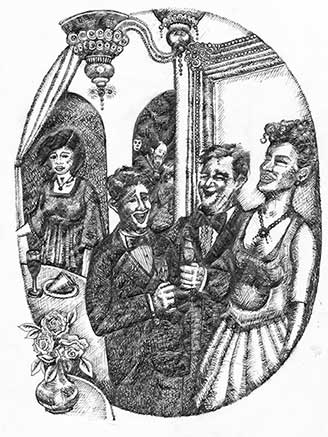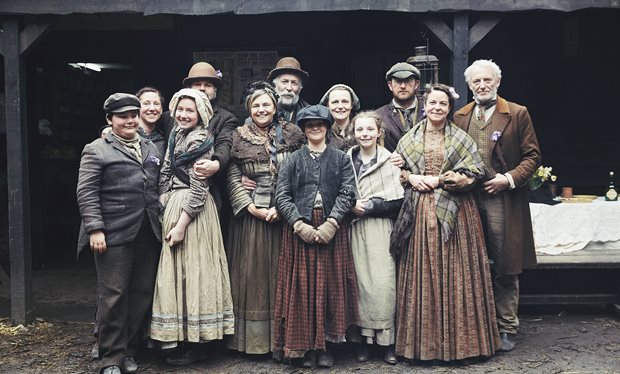19th Century Slums – The Uncomfortable Parallels

BBC’s Victorian Slums
I’ve recently finished watching BBC’s Victorian Slums, a 5-part ‘reality’ show where a group of 21st-century Brits move into a Victorian Work House, painstakingly brought back to life in the heart of London’s East End. The Work House was a place for those with little prospect of a living wage, or a sickness or disability that prevented them from working. Starting from the 1850’s to the 1890’s, each episode reflects political and industrial changes through each passing decade. The slum dwellers, made up of modern families, couples, single mothers, the disabled etc, experience Victorian hardship and insecurity first-hand, facing the grim reality of life for the urban poor and the truly squalor side of the industrial revolution.
Watching the programme, there were some uncomfortable parallels within our modern society that I drew on. Work was on a temporary basis, much like our present ‘zero-hour contracts’, and for many able to work, including the children, it was a daily slog to find cash to pay off the rent and other hiking debts. Slum dwellers were often exploited by businesses through low wages, mother’s worked from home on irregular income as they juggled caring for their hungry children in cold, damp conditions.
“We’re in debt before we do anything”
“We’re in debt before we do anything,” retorts one of the re-enacted slum dwellers, as he desperately struggles to find work whilst ailing a bad back, before the rent is due at the end of the week. It was a sentence that sounded particularly familiar to today’s climate, as we witness the mounting student debt crisis, the mass inequality in the developed world which still exists today and the rising number of Food Banks whom even the employed are forced to visit. Seeing a single mother’s plight to pay rent and food as the sole earner was a distinct reminder of my own past circumstance, where I existed to just work and provide.
Being self-employed and the only earner, work is on a temporary basis and although I am fortunate enough to have skills and opportunities that pay well, there is always a worry that there will be no work, as is often the case. I recall still working in front of my computer through labour pains, then returning to work three days after having an emergency caesarian section. Or more recently, when I fell very ill with Graves Disease where not working was not an option. However the mental exhaustion eventually took its toll and work suffered. Having a thyroidectomy eventually mended me although I was back to work a week later, flying out to Dubai on another contract job, concealing a healing gash across my throat with a scarf.
I became self-employed to get the Work/Life balance that we so often hear about in the workplace but the reality is that I work through breaks, eating with one hand, tapping on the keyboard with the other, fuelling up on caffeine to keep me going and regularly working into the evening. The daughter is often neglected and palmed off with an iPad to avoid disturbing me. Work/Life balance feels like an illusion.
Are my own working conditions drastically better than our Victorian poor, where health and safety is neglected, where I face the same insecurities of temporary work? And what of the masses of ‘slaves’ working on zero-hour contracts and poor pay, often found in call-centres and distribution warehouses, clocking in and out, having their toilet breaks timed?
Staff at Amazon have complained about the online giant’s treatment of its workers. Often on zero-hour contracts, the staff are forced to work long hours with minimal breaks. They claimed their movements were monitored by GPS trackers, and only 30 minutes was given for lunch in a ten-hour shift (20 minutes of which was spent walking to and from the canteen). Workers also reported being searched for stolen goods at airport-style security checkpoints before going into the canteen. It was also alleged that Amazon issued penalty points to workers, for talking to colleagues or taking sick leave, on a “three strikes and you’re out” basis. 1
“We’ve been forgotten about”
It is startling to consider that over 150 years on, our sociopolitical conditions have not progressed as far as we are led to believe, particularly for the poorer working classes. The mechanical smog fuelled, poverty stricken cities described by Charles Dickens could echo our 21st century world. “We’ve been forgotten about,” resonated true for the slum dwellers as they do for the ‘Brexit’ voters today; those from mining towns that time had forgot once the pits closed down in the Thatcherite years. With no other work to find, it broadened a deeper divide between the affluent and poor.
At the end of the series, the slum dwellers are relieved to go back to their modern lives, astounded by how the poor were treated no better than animals, where their only crime was being poor but yet were made to feel like criminals. “What we can learn from this is for it to never happen to anyone again,” one contemplates.
- http://www.independent.co.uk/news/business/news/amazon-devastating-expose-accuses-internet-retailer-of-oppressive-and-callous-attitude-to-staff-10458159.html 16th Aug 2015 and https://www.channel4.com/news/anger-at-amazon-working-conditions 1st Aug 2013
 Nancy Jim
Nancy Jim 